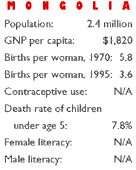 First Soviet Communists and now free marketeers have worked to urbanize the Mongols. But at least half of them remain nomadic, and among the city dwellers there is a revival of Mongol traditions, albeit in modern form. A giant billboard of Ghengis Khan’s mother–acknowledged to have been a brilliant strategist–can be seen in Ulaanbaatar, Mongolia’s capital. And both Ghengis and the legendary female warrior, Mandahai, have popular rock bands named after them.
First Soviet Communists and now free marketeers have worked to urbanize the Mongols. But at least half of them remain nomadic, and among the city dwellers there is a revival of Mongol traditions, albeit in modern form. A giant billboard of Ghengis Khan’s mother–acknowledged to have been a brilliant strategist–can be seen in Ulaanbaatar, Mongolia’s capital. And both Ghengis and the legendary female warrior, Mandahai, have popular rock bands named after them.
Lkhamsuren Oyuntsetseg, 33, straddles the modern and the traditional. She works as a pharmacist and has two children. But for seven years, she has lived in a one-room tent on the outskirts of Ulaanbaatar. Her husband, Regzen Batsuury, a construction worker, recently built the family a house.

LKHAMSUREN OYUNTSETSEG: I like my work, and I believe that good will come of it. It’s important to me to help people.
I think that every woman should be a mother, to carry on the generations. I only want two children; my husband says that whatever method I choose to prevent pregnancies is fine. My grandmother told me about sex; I want my daughter to know these things, so she won’t get pregnant before she is married.
Things were better under socialism. We used to have enough money, but now, under the market economy, we don’t. Unemployment is very high. Teachers are on strike because their salaries are too low. Most people earn too little to lead a normal life.















